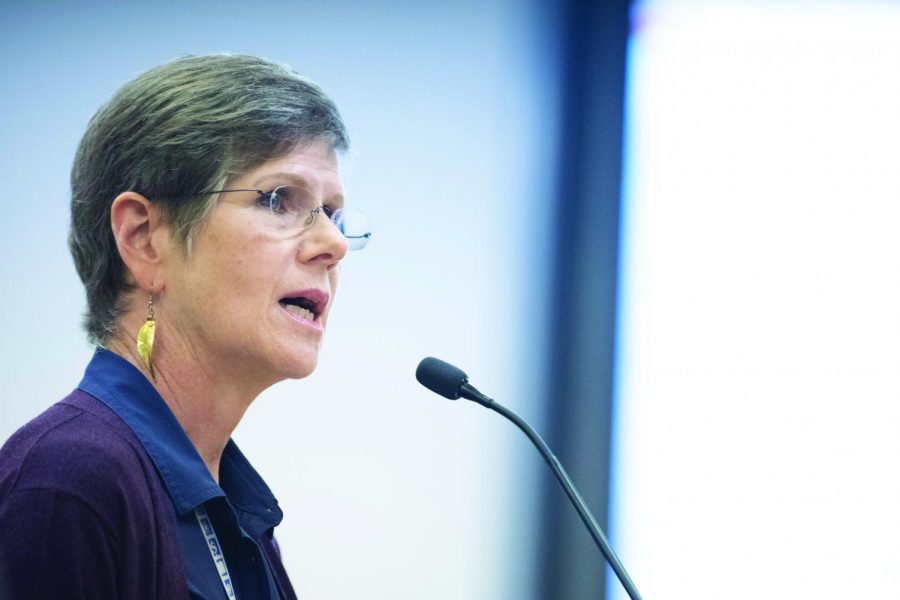Committee proposes changes to Inclusionary Housing Ordinance
Colin Boyle / The Daily Northwestern
Housing and grants division administrator Sarah Flax speaks at a city meeting. On Monday, Flax presented proposed changes to the city’s Inclusionary Housing Ordinance.
October 9, 2018
Concerns that developers were too easily able to avoid adding affordable units to their buildings led a city committee to propose changes that would strengthen the Inclusionary Housing Ordinance.
The changes, discussed on monday by aldermen Administration and Public Works Committee meeting would potentially tighten requirements for affordable on-site units and provide more incentives for developers to have such units.
To comply with the current ordinance — implemented in January 2016 — developers can make 10 percent of units affordable, give a fee-in-lieu payment, suggest an alternative equivalent proposal or petition for a reduction of requirements.
The Inclusionary Housing Ordinance Subcommittee — created last October to amend the ordinance to more effectively require on-site affordable units — and city staff recommended council approval of the proposed changes, according to city documents.
The proposal suggests changes to multiple aspects of the ordinance including definitions of terms, requirements and the eligibility of households for affordable units.
The proposal comes after community members have expressed concerns that the existing ordinance has not yielded enough on-site affordable units from approved developments. A spate of proposed highrises in 2017 and early 2018 added fuel to the fire, and residents were particularly frustrated when aldermen approved the controversial Albion development on Sherman Avenue. The developers had elected to employ an alternative equivalent proposal, which included making less than 10 percent of the 273 units affordable.
Sue Loellbach, director of development at Connections for the Homeless, a nonprofit advocacy group, said she is “actually very happy” with much of the proposal to change the ordinance.
She added that both Connections for the Homeless and Joining Forces for Affordable Housing, two local nonprofits that assist individuals with affordable housing needs, sent a letter to the council and subcommittee asking for changes to the proposal, but that overall the organizations were “very encouraged” by the suggestions.
“We’d like to see the possibility of making all of the units the same both on the inside and the outside,” Loellbach said at the meeting. “There is the risk of stigmatizing families that live in the lower priced units if they look different, if they’re smaller, things like that.”
Housing and grants division administrator Sarah Flax said the subcommittee is “really trying to incentivize” on-site units. Flax said the proposal outlines only two circumstances that the ordinance would allow a fee-in-lieu payment: If the developer is not asking for any zoning changes or building allowances or if the developer is building condominiums.
The new ordinance also requires any development asking for allowances to have a minimum of 5 percent on-site affordable units and pay a fee-in-lieu for remaining units. The revisions also suggest increasing the fee-in-lieu payments to deter developers from choosing that option.
The changes additionally would give some structural and parking bonuses to developers that provide on-site affordable units. City zoning planner Melissa Klotz said at the meeting that the proposal will help give developers a better understanding of public benefits.
“The project will end up being essentially the same,” Klotz said, “it’s just that the developers know from the beginning this is the expectation.”
Flax also said the Housing and Homelessness Commission has been looking at additional sources of revenue for the Affordable Housing Fund. She said the commission discussed the proposed real estate transfer tax — which will be on the November ballot — as well as changing the demolition fee or a taxing some rental units.
Council will vote on whether to adopt changed ordinance at a meeting Oct. 30.
Email: [email protected]
Twitter: @sn_handler


